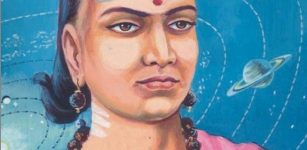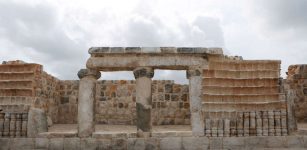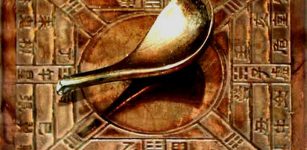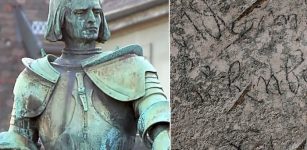Goddesses Of Fate And Destiny In Greek, Roman And Slavic Mythologies
A. Sutherland - AncientPages.com - An Italian humanist philosopher of the early Renaissance, Giovanni Pico della Mirandola (1463-1494), said that the human being is the master of his own life because human nature is a repository of instruments by which each individual can shape their life.
Rodzanice, narczniki, sudiczki - in the Slavic religion, invisible spirits or deities of fate. Generally mentioned in number three, but sometimes mentioned in number four, five, seven or even nine, of which one was "queen". Image credit: Marek Hapon, 2015 - CC BY-SA 4.0
However, those who oppose this belief say that human life results from fate's action - the final and irreversible will of the higher powers. There is no choice; fate is unavoidable, and it is simply our destiny, followed by the end of everything, which means - death.
Throughout the ages, myths and legends about fate have reflected our beliefs. People have often wondered about fate and its power.
The idea of a person's fate being spun was widely known in ancient Europe.
Three mythological goddesses known as "Fates" (with many names in respective languages) represent a common motif in European beliefs. Ancient people respected the idea of a person's fate being spun by divine beings.
According to Norse beliefs, the Norns were responsible for fate. They spun the thread of life at the roots of the World Ash, Yggdrasil.
"The Parcae," ca. 1885) by Alfred Agache. Image via wikipedia
Greek myths and legends make it clear that our attempts to outmaneuver an unavoidable fate are pointless. To the Greeks, fate and its influence on human life were of great concern, and countless myths and texts describe them as ugly older women, sometimes with disabilities.
Their fate goddesses were the Moirai/Moerae (sometimes called 'daughters of the night'), who sprang for each mortal. It is said that they were concerned with death but later began to decide what must happen to individuals.
They may have originated as birth goddesses, also concerned with death, but they later acquired their reputation as agents of destiny and those who control the Threads of Fate.
The Moerae sisters are known as Clotho ("the spinner"), who spins the thread of life, Lachesis ("the allotter or 'drawer of lots'), who assigns each person's destiny and Atropos ("the inevitable"), with scissors in her hands, decides when to snip the thread of life at its end.
They were worshipped as goddesses, and it is said that brides in Athens offered them locks of hair, and women swore by them. The Moirai were independent, and Zeus and other gods, as well as men, had to submit to them.
In Roman mythology, the Parcae (the equivalent of the Moirai) were the female goddesses of destiny. They were usually depicted as women weaving a tapestry covered with men's destinies.
Like the Norse and Greek goddesses of fate, they exercised the same arts. One was busy spinning the yarn, another was drawing out the thread, and another was cutting it.
The three Parcae sisters - Nona, Decima, and Morta - controlled the thread of life of every mortal and immortal from birth to death. Both gods and humans feared their unlimited power.
In the mythology of Slavic people, the Sudice (known after different names among the ancient Slavs) were responsible for the fates and destiny of humanity. They judged and meted out fortune and fatality.
They could appear as a single goddess or as three sisters at the birth of a child, just in time, when a newborn's fortune was foretold and destiny was sealed. The oldest of the sisters spoke last; her words could never be revoked or contradicted.
Fate was determined for all, regardless of whether they were good or wrong.
The Sudice were beautiful old women with white skin and white clothes. They wore necklaces of gold and silver, white kerchiefs, and sometimes carried lit candles. The ancient Slavs made offerings to them in the form of bread, candles, and salt.
Written by – A. Sutherland AncientPages.com Staff Writer
Updated on March 28, 2024
Copyright © AncientPages.com All rights reserved. This material may not be published, broadcast, rewritten or redistributed in whole or part without the express written permission of AncientPages.com
Expand for referencesReferences:
Gieysztor Aleksander, Mitologia Słowian
Cotterell, A. A Dictionary of World Mythology
Monaghan P. Encyclopedia of Goddesses and Heroines
Tanner, Ross. Greek Mythology:
More From Ancient Pages
-
 Millennia-Old Sumerian Tripod Vase Dedicated To God Ningirsu, The Son OF Enlil
Archaeology | Oct 6, 2016
Millennia-Old Sumerian Tripod Vase Dedicated To God Ningirsu, The Son OF Enlil
Archaeology | Oct 6, 2016 -
 Famous Philosopher Plato: One The Greatest Thinkers Of All Time And His Concept Of Soul
Featured Stories | Jun 25, 2018
Famous Philosopher Plato: One The Greatest Thinkers Of All Time And His Concept Of Soul
Featured Stories | Jun 25, 2018 -
 Is Mysterious Herlaugshaugen The Ship Burial Of Viking King Herlaug?
Archaeology | Jul 11, 2023
Is Mysterious Herlaugshaugen The Ship Burial Of Viking King Herlaug?
Archaeology | Jul 11, 2023 -
 What Caused The Year Without A Summer In 1816?
Ancient History Facts | Sep 17, 2018
What Caused The Year Without A Summer In 1816?
Ancient History Facts | Sep 17, 2018 -
 Varahamihira: Indian Sage And One Of The Greatest Minds Of All Time
Featured Stories | Sep 13, 2016
Varahamihira: Indian Sage And One Of The Greatest Minds Of All Time
Featured Stories | Sep 13, 2016 -
 DNA Of 10,000-Year-Old Luzio Solves The Mysterious Disappearance Of The Sambaqui Builders
Archaeology | Jul 31, 2023
DNA Of 10,000-Year-Old Luzio Solves The Mysterious Disappearance Of The Sambaqui Builders
Archaeology | Jul 31, 2023 -
 Lost Advanced Ancient Forest Civilization In The South West Pacific Could Re-Write History – Legends And Archaeological Findings Examined
Ancient Mysteries | Apr 25, 2018
Lost Advanced Ancient Forest Civilization In The South West Pacific Could Re-Write History – Legends And Archaeological Findings Examined
Ancient Mysteries | Apr 25, 2018 -
 Ancient Mayan City Filled With Palaces, Pyramids And Plazas Discovered On Construction Site In Mexico
Archaeology | May 27, 2022
Ancient Mayan City Filled With Palaces, Pyramids And Plazas Discovered On Construction Site In Mexico
Archaeology | May 27, 2022 -
 What Were The Most Important Inca Laws That All Citizens Had To Respect?
Ancient History Facts | Aug 16, 2017
What Were The Most Important Inca Laws That All Citizens Had To Respect?
Ancient History Facts | Aug 16, 2017 -
 Magnetic Compass Was Invented In Ancient China
Ancient History Facts | Mar 18, 2016
Magnetic Compass Was Invented In Ancient China
Ancient History Facts | Mar 18, 2016 -
 Lacrosse Was Invented By Native American Indians
Ancient History Facts | May 1, 2016
Lacrosse Was Invented By Native American Indians
Ancient History Facts | May 1, 2016 -
 Mysterious Gold-Colored Chariot Washes Ashore In India – But Where Did It Come From?
News | May 12, 2022
Mysterious Gold-Colored Chariot Washes Ashore In India – But Where Did It Come From?
News | May 12, 2022 -
 Rare 2,500-Year-Old Saw Discovered At The Ancient Hittite City Hattusa
Archaeology | Nov 27, 2023
Rare 2,500-Year-Old Saw Discovered At The Ancient Hittite City Hattusa
Archaeology | Nov 27, 2023 -
 Unique Finds Discovered In Oman – Rub’al-Chali Desert Reveals Its Secrets
Archaeology | Apr 20, 2023
Unique Finds Discovered In Oman – Rub’al-Chali Desert Reveals Its Secrets
Archaeology | Apr 20, 2023 -
 Mystery Of The Faceless Creature – Ancient And Modern Sightings
Ancient Mysteries | Jun 19, 2018
Mystery Of The Faceless Creature – Ancient And Modern Sightings
Ancient Mysteries | Jun 19, 2018 -
 Recreation Of Cleopatra’s Ancient Perfume
Archaeology | Aug 26, 2019
Recreation Of Cleopatra’s Ancient Perfume
Archaeology | Aug 26, 2019 -
 A Graffiti Inscription With The Name Of Knight Adrian von Bubenberg – Found On Mount Zion In Jerusalem
Archaeology | Nov 30, 2022
A Graffiti Inscription With The Name Of Knight Adrian von Bubenberg – Found On Mount Zion In Jerusalem
Archaeology | Nov 30, 2022 -
 An Ancient Goldsmith’s Unexplained Encounters With The Unknown
Ancient Mysteries | Apr 16, 2019
An Ancient Goldsmith’s Unexplained Encounters With The Unknown
Ancient Mysteries | Apr 16, 2019 -
 Unraveling The Mystery Of Ancient ‘False Doorways’
Ancient Mysteries | May 24, 2014
Unraveling The Mystery Of Ancient ‘False Doorways’
Ancient Mysteries | May 24, 2014 -
 Unusual Medieval Picture Stone Found Under House In Klotzow, Germany
Archaeology | Aug 26, 2024
Unusual Medieval Picture Stone Found Under House In Klotzow, Germany
Archaeology | Aug 26, 2024


